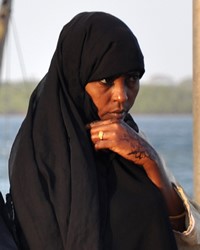Swahili in Sudan

Photo Source:
Luciano Rizzello - Flickr
Creative Commons
|
Send Joshua Project a map of this people group.
|
| People Name: | Swahili |
| Country: | Sudan |
| 10/40 Window: | Yes |
| Population: | 29,000 |
| World Population: | 1,196,000 |
| Primary Language: | Swahili |
| Primary Religion: | Islam |
| Christian Adherents: | 0.00 % |
| Evangelicals: | 0.00 % |
| Scripture: | Complete Bible |
| Ministry Resources: | Yes |
| Jesus Film: | Yes |
| Audio Recordings: | Yes |
| People Cluster: | Bantu, Swahili |
| Affinity Bloc: | Sub-Saharan Peoples |
| Progress Level: |
|
Introduction / History
The name Swahili literally means "coast," and is the name given to several people groups that share a common culture (Uswahili), language (Kiswahili), and religion (Islam).
Thousands of years ago, groups of hunters inhabited the East African coast and intermarried with the Cushite shepherds there. By the second century, Bantu-speaking people from northern Congo came to the area and intermarried with them. Subsequent groups of people migrating from other areas such as the Persian Gulf also joined these coastal people, adopting parts of their culture and language. Later, Indonesian, Hindi, and Portuguese traders settled on the coast. Soon, they too began adopting Swahili traits and became a part of the larger group. Since that time, groups of Swahili have migrated to different parts of the coast, forming their own dialects and cultural variations.
Where Are they Located?
Today, the Swahili are scattered along Eastern Africa and the Persian Gulf, from Saudi Arabia to Zambia. A smaller number have migrated inland to Sudan.
What Are Their Lives Like?
Since the Swahili are predominantly Muslim, Islamic practices play a large role in their daily activities. Dietary laws, rules of dress, social etiquette, marriage ceremonies, laws concerning divorce, and rituals at birth and death are all governed by Islamic tradition. Parents strive to have well-mannered, respectful children, since this is highly valued among Muslims. Boys go to Islamic schools where they study the Koran.
What Are Their Beliefs?
Though they are Sunni Muslim, they still practice many traditional pre-Islamic beliefs. For example, they believe that many good and evil spirits exist, so they act accordingly. They also believe in the supernatural power of witches and sorcerers.
What Are Their Needs?
The small number of Swahili people in Sudan need the spiritual hunger to seek and find their Savior.
Prayer Points
Ask God to raise up prayer teams to break up the soil through worship and intercession.
Pray for spiritual hunger.
Ask God to raise up Christian businessmen in Africa who will boldly share Christ with the Swahili.
Ask the Lord to raise up strong local churches among the Swahili in Sudan.